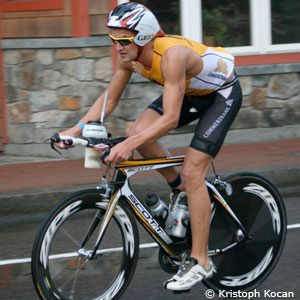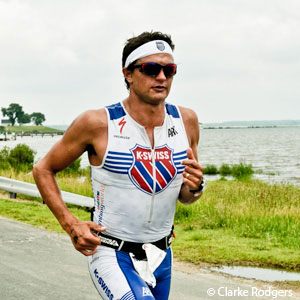Mike Caiazzo – a balancing act
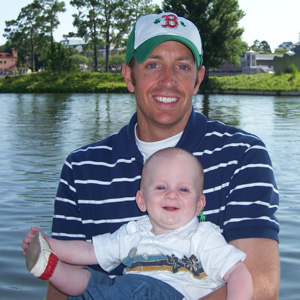
Mike Caiazzo recently finished 4th at Ironman Lake Placid, but in addition to racing and training as a Pro triathlete he has to deal with his full time hedge fund job and his role as a husband and father. That is a tricky balancing act indeed.
Slowtwitch: Fourth place overall isn’t too shabby for a first attempt at an Ironman event. Were you surprised?
Mike: Honestly, no not really, I thought if everything went as planed I could go 8:45, but if I made a few mistakes or if was off a bit I would go 9:15 or even not finish. I did have a lot of unknowns, such as how I would handle the last hour the bike and the last 13 miles of the run and how my body would handle my nutrition plan. I did go out a bit too hard on the bike and really paid for it during the last hour of the bike. My watts during the last 60 minutes were 20% less than my goal watts and what I had averaged during the first 4 hours of the bike.
ST: How did your recovery go from that event?
Mike: My recovery is going well. My plan was to take the week after completely off and then slowly get back into the next week. My first workout was a 4 mile run the Sunday after and my quads were still very sore. Because of the low training volume I knew that I would be sore for a long time. Normally when racing half ironman races I am unable to train for 3-4 days after the race because of being sore.
St: Word is that you were actually a reluctant starter in Lake Placid. What made you decide to race?
Mike: My coach Kurt Perham (www.PBMCoaching.com), brought the idea up that I should race Lake Placid at the end of June of this year. He said if I was able to get in 2 long bricks I would be good to go. I said only if both workouts went well would I sign-up. The first workout went great and the second one did not go well at all, although after the first workout went so well I had mentally committed to racing LP. When I arrived at LP the Friday before the race and was walking around the expo I started thinking “What the hell am I doing?” I thought that I had no business trying to finish an Ironman training 10 hours a week. Then when I thought about my goal of going under 9:00 it even made me more hesitant, but it was to late then because my whole family was there ready to watch me race.
ST: 10 hours a week does not seem the time that others put in who do well. Can you tell us more about it?
Mike: Since I work full time (8-5, M-F), and have a wife and two kids (Jack 2.5 years and Hunter 15 months) along with 2 dogs my time is very limited. I have a coach, Kurt Perham, but I use the term loosely. He doesn’t design a training plan or send me workouts, like a typical coach. He is more of an advisor who I bounce training ideas off and he keeps me focused. Kurt used to coach me full-time, but with all of the other stressors I found it too tough to keep to a schedule. Now I don’t plan any workouts and don’t write anything down. If I am tired after getting home from work and don’t feel like working out I just skip it. Since it is not written down I don’t dwell on the missed workout as much. I train depending on how I feel. I also stopped keeping a training log because it would stress me out when I would see so many zero’s in the log and see how low some of my training weeks were. There is no such thing as a “typical” week for me. I swim during my lunch break 3-4 times a week for about 45 minutes with a masters group. I try and run 2-4 times a week, with one run being long, 12-16 miles and the other runs being 5-8 miles. On the bike I usually get 2 rides in, 1 ride for an hour easy and a long ride of 2-3 hours on the weekend. Most of my workouts are either before 6am or after 8pm (which is when the kids go to bed) or on the weekend during their nap (1-2 hours). My volume is normally around 8-12 hours. It is far from ideal, but seems to work ok. If I was able to get a few more workouts in and train 20 hours a week I think I would be very competitive in both the 70.3 distance and Ironman races.
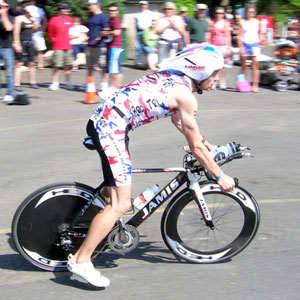
ST: According to your race report you had problems with nutrition. What do you think went wrong?
Mike: I didn’t necessary have problems my nutrition it was just that my plan went out the window early in the bike. The weather forecast for the race was showers and cloudy, so I thought that I would be fine not taking much salt. Unfortunately my large SaltStick broke a few days before the race and I was only able to get a small one as a replacement. So I only had 3 salt pills on the bike. I also made a last minute switch (race morning) from Lava Salts to Hammer Electrolytes because the Lava Salts gave me a stomach ache. My plan was to take two water bottles filled with 600 calories on the bike for the first 2 hours and take 3 gels for the last hour. I would sip on water/Gatorade while passing trough aid stations. About 90 minutes into the bike I was already through my first water bottle and was dying of thirst on the bike. I knew that I needed more water and electrolytes than I had planned due to the warm weather. The problem was that by drinking Gatorade I was taking in more Calories/Carbohydrates than I had planned or needed.
ST: So what will you change for the next Ironman in terms of nutrition?
Mike: Next Ironman I will take in more salt, especially since my next Ironman will be in a warmer climate. I will also not put as many calories in my bottles on the bike and rely more on the nutrition on the course. Other than that I think I did a decent job.
ST: Talk about your recent injury. What happened and how long did that take you away from training?
Mike: I had chronic Achilles- tendonitis since 2005 where I ran in pain for every run and had to limit my running to less than 30 miles a week. At the end of 2007 I took 4 months off and within the first week my Achilles was just as sore as at the end of the season. At the end of May of 2008 my Achilles was so bad that after a race I was not able to run for 1-2 weeks. I was diagnosed with Achilles tendonitis and the doctor recommended a procedure using radiofrequency called Topez. I had the procedure done in August of 2008. The plan was to try and start running at the end of November. During the first few easy jogs the pain was still there. I was really down about the whole thing and unfortunately was not biking or swimming. At the beginning of January I tried running again and the pain was still there, but I knew that if I didn’t start training I would not be in shape to race well for 2009. So I began running and just endured the pain. It was until late March, during a run that I realized that my pain had gone. I was so accustom to running with pain that I didn’t even know that it had gone away.
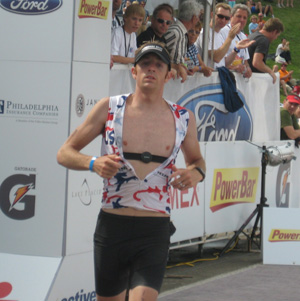
ST: Prior to Ironman Lake Placid, what would you consider your best race to date?
Mike: Personally I don’t think Lake Placid is my best race to date. I thought that I made quite a few mistakes during the race. In 2007 I raced Eagleman 70.3 in 3:55 and came in 4th overall. I biked 2:10 and ran 1:15.
ST: What is your athletic background and who or what inspired you to race triathlons?
Mike: I was very athletic as kid and played all of the typical American sports: basketball, baseball and soccer. I also ran as a young kid doing my first road race when I was 5 years old. I was always very competitive in running so as I got older I started focusing more on running and slowly phased out playing other sports. During high school I ran cross-country and track and during the winter played basketball. In college I ran cross-country and indoor/outdoor track at Duke University. I did not have a very successful running career in college due to numerous injuries.
ST: You are racing in the Pro category, but you have another job, is that correct?
Mike: That is correct. I work full time for a hedge fund administration firm in Portland Maine. Before that I worked on the floor of the American Stock Exchange in New York City as an Options Market Maker. My goal this year is to get a few more sponsors for next year so that I would be able work part-time and be able to race competitively.
ST: Considering you have this day job, when did you turn Pro and why?
Mike: Turning pro was an easy decision for me, even though many people told me not to. The main reason I turned pro was so that during the race I would know what place I was in. I didn’t like racing as an age-grouper because I never knew what place I was in overall or even in my division. I don’t think racing in the pro division is any tougher than as an age grouper. There are different challenges in each race which is why I also think that age-groupers should be listed in separate results from the pros. If an age grouper is fast enough to place near the top ahead of pros they should race in the pro division. Just because someone races in the pro division doesn’t mean they have to quit their job and disown their family.
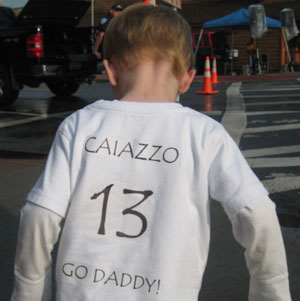
ST: Tell us about your sponsors.
Mike: This year I joined a new team, USPro Tri (www.USProTri.com). We have a bunch of great sponsors this year who have provided me great gear to race and train on. The bike I race/train on is a Jamis Xenith T2, which has worked out great. Our race wheels are Hed wheels which very fast. Some of my other sponsors are Aquaman wetsuits, Newton running shoes, Dr Sears Zone Diet, Nathan Sports, CeraSport, Suunto, Kurt Kinetic, Limar helmets, Selle Italia saddles and Mt Borah for our uniforms.
ST: Most people choose to race triathlon because they like the individuality of the sport. As a member of US Pro Tri you have gone down a different road. What do you think are the advantages and disadvantages of being part of a team?
Mike: The main advantage for someone like myself is to have one focal contact point for all of my sponsorship needs. So rather than having to negotiate numerous companies I just have to talk with the manager of the team, Ryan Bates. I also think it is better for some of the smaller triathlon companies to sponsor a team like this because they end up getting a bit more bang for their buck.
ST: Do you follow any other sports?
Mike: Since I went Duke it would be a sin not to follow Duke Basketball. Growing up and living in Maine I am Red Sox fan so I follow baseball.
ST: Can you share with us some of your food likes and dislikes?
Mike: I really like pizza, ice cream and fast food! Nothing is better than a nice greasy cheese burger from McDonalds. I try to eat somewhat healthy, but don’t do a very good job at it. I normally eat fast food 1-3 times a week and pizza 1-3 times a week. Personally I think it is all fuel for the fire! I eat pretty much everything, but if there was something that I dislike it would be vegetables in general.
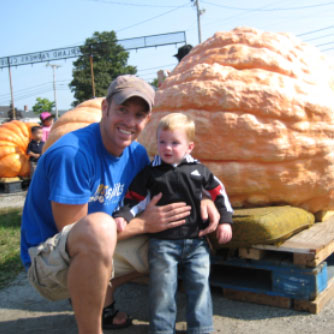
ST: What music do you like?
Mike: I normally only listen to music while training and only listen to rap, such as Eninem and Lil’ Wayne. I also listen to rock/alternative when driving in my car.
ST: What was the last book you read?
Mike: I don’t have much free time so I tend not to read much (like nearly never.) The last book was a few years ago and was “Running with the Buffaloes” by Chris Leer. During the summer before my senior year I went to Boulder, Colorado to get ready for cross-country and trained with many of the University of Colorado team members. This was the summer right before the season this book was written about. It is a great read about one of the top running programs in the US.
ST: Where do you see yourself in 5 years?
Mike: That is tough one. Honestly I am not sure. I do know that my sons will be 6 and 7.5 years old so I will be going to all of their baseball, basketball, soccer, etc practices and games. My ultimate goal is to be able to turn my “hobby” into a career.
ST: Is there anything else we should know about you?
Mike: Let’s see…… Most people are usually surprised to find out that I have my tongue pierced and also used to have my elbow pierced. To find out more about me or see my racing schedule/results you can visit my website www.MikeCaiazzo.com.
ST: Hang on, elbows pierced?
Mike: Yes got it done my senior year of college. I wanted to get something done that was a bit different, but was not permanent and was not obvious. I got the idea from Chris Severy who was one of the top runners at the University of Colorado. I met him the summer before my senior year in Boulder and was one of the nicest guys I have met. It turned into a bit of tribute to him because that fall he was in a bike accident and passed away.


